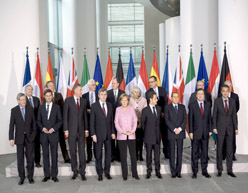Recurrent crises in Capitalism call for a new economic model

BERLIN, Germany - European leaders met in Berlin in February ahead of the April G20 meeting in London to seek a new economic model devoid of the recurrent cyclical crises that have become the incurable bane of modern Capitalism. Deliberations at the summit illustrated that the West, the traditional flag bearer of Capitalism, had but conceded the death of Capitalism, whose bleak future was aptly summarized by Nobel Prize Economics laureate Joseph Stiglitz, who has equated the harm done by the fall of Wall Street to free market fundamentalism with what the fall of the Berlin Wall did to Communism.
This analogy is strikingly clear. Indeed, when Communism imploded in 1990, it was hailed as a long expected outcome of an inherently defective model, whose intrinsic time-set, self-destructive mechanism went into action the very moment it was conceived by the leading economic philosophers of their times. Most importantly, the failure of Communism unequivocally underscored the superiority of Capitalism as the better economic model, making it the default option for most countries to follow in the post-Communist era.
However, the euphoria that accompanied the fall prevented experts to examine the real reasons that finally destroyed Communism. It is clear now that the reasons were not only in the system itself, but also in the people that headed governments built on communist ideology. This cause-effect explanation now gives invaluable insight into the current crisis of Capitalism. It will not be enough today to simply resort to the traditional popular academic cyclisism theory to explain the recurrences of crises in capitalist economies, because it has now been agreed that the present global financial meltdown is exclusively ‘anthropogenic’ in origin.
The reasons for the fall of modern Capitalism are diverse, ranging from poor oversight to blatant corporate greed and irresponsibility on Wall Street and other global financial centers to Ponzi schemers such as Madoff and Stanford, the ‘postermen’ of today’s Corporate America. Equally worrying are the anti-crisis measures being adopted by governments, such as protectionism, nationalizations and multibillion interventions in national economies — strategies bearing the traditional trademark features of a socialist economy, and hence questioning the legitimacy of Capitalism as the world’s most effective economic model.
It will, indeed, be difficult to find a better obituary for Capitalism than Stiglitz’s epitaph, and this leads to the ultimate question: Does this mean that Capitalism is now dead? There is no single answer to this rhetorical question, but suffice it to say that Capitalism, because of its inherent problems that were aggravated by unprecedented poor regulations and recklessness on Wall Street, has now lost its self-proclaimed right to the best form of entrepreneurship ever invented by humanity.
This, consequently, calls for a new economic model fully devoid of the excessiveness not only of Communism and Capitalism, but also of the avaricious CEOs, irresponsible financial institutions and national economic egoism. Such a model holds the keys to success in the global economy of the 21st century.












 Web design,
Web design,